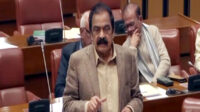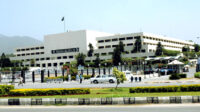Prime Minister Shehbaz Sharif’s tenure has marked a defining shift in Pakistan’s political and economic trajectory. Since taking office following the general elections of 2024, Sharif has sought to chart a course that stabilizes the country’s tumultuous economy while focusing on long-term growth and regional influence.
His pragmatic approach to leadership—marked by strategic economic reforms, strong diplomatic engagements, and a focus on youth empowerment—has laid the groundwork for significant change. What stands out most is his vision of a future that prioritizes youth, with a clear focus on creating opportunities in skill development, entrepreneurship, and employment. By integrating youth into Pakistan’s future economic plans, he hopes to address the country’s greatest asset—the demographic potential of its young population—and transform it into a sustainable engine for growth.
Upper floors of mosque demolished in Uttar Pradesh as Ramadan begins
“If you are really a good team….’: Saqlain’s open challenge to Team India
US Spaceship Hours Away From Daring Moon Landing Attempt
For more such Opinions & Blogs, click here.
Sharif’s leadership has also been highlighted by Pakistan’s role in global diplomacy. Hosting key international conferences such as the Shanghai Cooperation Organization (SCO) 2025 summit, the CAYA (Creating a Youthful Asia) Conference, and the International Girls Conference has brought Pakistan into the international spotlight. These initiatives reflect his commitment to strengthening Pakistan’s diplomatic relations, particularly with key regional players like China, Russia, and Central Asia. Through these conferences, Sharif has demonstrated an unwavering commitment to tackling issues such as gender equality and regional security, areas that align with his broader vision of sustainable growth and cooperation.
Economically, the country is showing positive signs of recovery. Under Sharif’s leadership, Pakistan’s GDP growth is projected to reach 2.8% in FY25, a commendable figure given the global economic turbulence. Inflation has decreased to 2.4%, offering a respite to citizens and businesses. While these economic indicators show promise, they must be viewed within the context of the deeper challenges that Pakistan still faces. For instance, poverty remains a significant concern, with approximately 40.5% of the population still living below the poverty line. Sharif has expressed his commitment to addressing this challenge by focusing on improving access to education, healthcare, and other social services—ensuring that economic growth benefits all segments of society.
Norway Firm Stops Fuel Supply To US Over Trump vs Zelensky
Partly cloudy weather with rain-wind, thunderstorm & snowfall over hills expected
Death anniversary of poet Nasir Kazmi today
Furthermore, Sharif’s government has made strides in attracting foreign direct investment (FDI), with a 20% increase in FDI reaching $1.3 billion in the first half of FY25. This is a strong indicator of growing confidence in Pakistan’s economic potential. The country’s foreign exchange reserves have risen to over $16 billion, a crucial buffer against external shocks, and remittances have provided substantial support to stabilize the economy. While the country has managed to achieve a historic current account surplus of $1.21 billion, challenges in Pakistan’s energy sector persist. The country remains dependent on imports for its energy needs, and rising fuel costs continue to strain both businesses and households.
Political stability remains another critical challenge. Despite Sharif’s effective leadership and growing international stature, Pakistan’s political environment is dynamic, and governance remains vulnerable to fluctuations. It will be crucial for Sharif to not only focus on economic reforms but also ensure that political stability is maintained to create an environment conducive to business and long-term investment. Stability is key to unlocking Pakistan’s potential and ensuring the benefits of Sharif’s economic policies are fully realized.
Champions Trophy: PCB announces full ticket refund for rain-cancelled matches
Several mega events organized in Balochistan
COAS underscores commitment to nurturing nation’s youth
Prime Minister Sharif has displayed a determination to address both short-term economic challenges and long-term structural issues. His vision for a prosperous Pakistan, one that is economically self-sufficient, regionally influential, and globally respected, is rooted in his emphasis on youth empowerment, economic stability, and strong international partnerships. While the journey ahead is far from simple, Shehbaz Sharif’s leadership marks a promising shift toward a more resilient and prosperous future for Pakistan. However, for his vision to come to fruition, it will require continued reforms, strategic management of resources, and political unity. The roadmap he has laid out is certainly ambitious, but it is one that holds the potential to make Pakistan a true game changer in the region.
For more such Opinions & Blogs, click here.
Efforts underway for exploration of oil, gas reserves
New Polio case reported from Sindh
DPM , Danish FM discuss bilateral ties
PM greets Muslims at start of Ramadan
This article is submitted by M. Zaeem Saqib.
Stay tuned to Baaghi TV for more. Download our app for the latest news, updates & interesting content!






